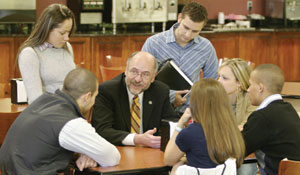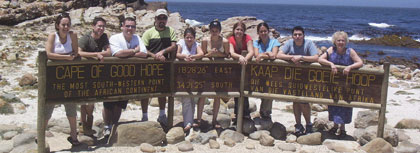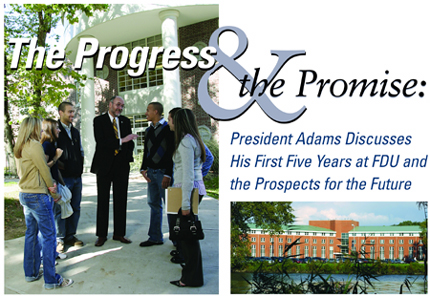
President J. Michael
Adams talks with
College at Florham
students in front
of the recently
renovated Student
Center.
At right, overlooking
the banks of the
Hackensack River
is Northpointe,
the new residence
hall on the Metro-
politan Campus.
| “I knew that Fairleigh Dickinson University had long been successful in transforming people’s lives through high-quality educational programs.” |
|---|
On July 1, 1999, J. Michael Adams became the sixth president of Fairleigh Dickinson University. Within one year he inspired a new mission devoted to global education and preparing global citizens and has since led the development of many important achievements (see “New and Notable — Global Education Milestones”). Reflecting on his first five years, President Adams recently discussed the accomplishments achieved and the challenges ahead.
Before joining FDU, Adams served 15 years as academic dean of the Nesbitt College of Design Arts at Drexel University, in Philadelphia, Pa., where he led the college’s transformation into one of the country’s premier design schools. He previously was a professor and administrator at the State University of New York at Oswego.
The author of eight books, Adams’ research covers a wide variety of topics including print, publishing, communication and career development, as well as topics specific to the field of higher education and, more recently, global education. He also is active on national and international education panels and commissions, serving, among other roles, on the executive committee of the International Association of University Presidents (IAUP) and the United Nations/IAUP Commission on Disarmament Education, Conflict Resolution and Peace.
In 1999, when you became president, what did you believe were the initial challenges and opportunities?
I knew that Fairleigh Dickinson University had long been successful in transforming people’s lives through high-quality educational programs. Yet we still struggled with establishing a distinctive identity for the University.
It was equally obvious that FDU had suffered some financial difficulties. We needed to focus on creating additional revenue streams and revitalizing the University’s giving programs.
So the question was how to better define ourselves in order to rise to the next level of prominence and thus become more attractive to prospective students and prospective donors.
How did the global mission develop?
My challenge was to learn all I could about the people and programs at FDU in order to help articulate a vision that could shape our future. I met with all 54 academic departments, visited countless alumni and corporate leaders and learned what made FDU so special.
“It became clear to me that in order to respond to the reality of globalization and to build upon our strengths and traditions, our mission must be a global one.” I learned that FDU was founded upon a need to be “of and for the world” and that we enjoyed a rich tradition of international programs. I discovered that many talented individuals had strong international reputations and were working very hard to convey important global lessons. It was also obvious that our location at the gateway to the Western world — the New York metropolitan area — had been an enormous advantage and one we could benefit from even more. Finally, I learned that corporate leaders needed people who could thrive and flourish in diverse environments. They needed global leaders.
It became clear to me that in order to respond to the reality of globalization and to build upon our strengths and traditions, our mission must be a global one. I proposed that we dedicate ourselves to the preparation of world citizens through global education. I was pleased of course when the Board of Trustees and the Faculty Senate approved the move, but I have been even more gratified to see people breathe life into this mission each day.
Why is global education important?
Global education is the educational imperative of the 21st century. In a world increasingly marked by interconnectedness and interdependence among countries, cultures and commerce, we need students who can easily adapt to different environments, collaborate with diverse people and make a difference anywhere on the globe. Whether you want to be an activist or an accountant, a security guard or a software programmer, your profession increasingly is woven with the interests of those from afar.
Many educators discuss the need to prepare students for such a world, but the reality is that education has been slow to respond to the forces of globalization; we still don’t know very much about each other. Business leaders have long recognized the need to cross borders and develop international understanding. Educators must catch up.
Can you define global education?
There is no one model or one path toward global education. Rather, it should be a constantly evolving process. Studying abroad and learning other languages are valuable; as is providing students with knowledge of other cultures, other lands and other perspectives. Such knowledge not only increases understanding about others, but it helps enlighten students about themselves and their place in the world.

President
J. Michael Adams discusses his thoughts on global education at Fairleigh Dickinson University with College at Florham student leaders.
| “For me, global edu- cation boils down to con- nections and perspectives. It’s about understanding the nature of the connec- tions that bind people from all corners of the globe, and it’s about expand- ing those con- nections for the betterment of all.” |
|---|
For me, global education boils down to connections and perspectives. It’s about understanding the nature of the connections that bind people from all corners of the globe, and it’s about expanding those connections for the betterment of all. It means considering the world as a whole, and introducing our students to multiple viewpoints, so they can develop the ability to look at the world through the eyes of others. This understanding is essential to reduce conflicts and forge solutions to our most critical local and global challenges.
How we convey such understanding and how we provide a global education is entirely up to the imagination and creativity of our faculty.
Now that more than five years have passed, what do you see as the challenges and opportunities facing FDU today?
Five years is not a very long time in the history of an institution, but I think what has transpired here has been very impressive. The adoption of a strong mission helped us launch exciting initiatives and refocus our efforts.
But we have only scratched the surface of our potential. We have a strong foundation in place and now the mission needs to come alive in everything we do. It must provide the foundation for everything from recruitment to programming to fund raising.
“If we can instill that sense of mission throughout the culture of Fairleigh Dickinson University, there’s no telling how many more opportunities we can offer students.” If we can instill that sense of mission throughout the culture of Fairleigh Dickinson University, there’s no telling how many more opportunities we can offer students.
Our other challenges relate to finances and enrollment. We have been able to balance the budget in each of the last five years, but it has not been without sacrifice. We need to continue to look for ways to be efficient and generate additional revenue.
Philanthropy will play a key role in further transforming this University. I believe that there are donors out there who will come to recognize and support the University’s global vision. I believe more and more people will want to be part of what we’re doing.
In addition, I also want to continue expanding our enrollment base. While we understand the importance of keeping New Jersey students in state, we also would like to attract more students from other states, as well as other countries.
Of what progress or changes are you most proud?
There have been certain accomplishments that are particularly worthy of praise. I’m very gratified, for instance, that the Silberman College of Business earned accreditation from the prestigious AACSB International – the Association to Advance Collegiate Schools of Business. I’m also excited about our new international partnerships and our increasing links to the United Nations. There’s our burgeoning theater arts major, which incorporates Wroxton College in England. And then there’s our groundbreaking online-learning initiative and the formation of the Global Virtual Faculty.
Another great example of innovation is Puerta al Futuro, our evening and Saturday program that enables Spanish-speaking students to learn English and gain an associate’s degree in just three years. This program responds to a real growing need and has attracted great interest. There are so many exciting programs to mention.
More than anything, I am grateful for the quality of people at this institution. They are the true agents of change. They deserve the credit for what has been accomplished, and they are the ones who should feel proud. The quality of our faculty and staff is immeasurable, and they are working very hard to serve our students.
How integral to the mission is online learning?
As I said, there are many ways to provide a global education, but online learning is especially important. There were two main reasons why we instituted the requirement for all undergraduates to take one online-learning course per year.
| “The key component of a good course … is the ability of the teacher to engage students in a meaningful manner.” |
|---|
We see the Internet as a vital research and information tool. Students must know how to use the Internet for their continuing education and development. The Internet also is pivotal because it enables us to overcome the limits of geography and borders, and it can connect students to ideas and people from other countries. This is most obviously illustrated at FDU through our Global Virtual Faculty, who provide international views via online learning.
So our primary purpose remains to use the Internet to bring the world to our campuses. Of course, as we strengthen our digital infrastructure and as faculty become more skilled with the technology, we are able to build on our strengths, offer more online programs and reach more students throughout the world.
There continues to be much debate about the merits of online learning, but the key component of a good course is the same on the Web as it is in the classroom: the ability of the teacher to engage students in a meaningful manner. That’s the magic that makes learning possible. And that can be done or not done in person or in cyberspace.
When speaking with potential students, how do you describe FDU?
Really all I do is describe what I see every day. I tell people this is an incredible place that is rapidly distinguishing itself in higher education. I tell students that they will meet and be impressed by countless caring, talented and devoted people.
President
J. Michael Adams listens as Metropolitan Campus
students share their
impressions of
collegiate life at
Fairleigh Dickinson.I do not promise them how much they will learn because I believe that education is not something we give, rather it is a collaborative process between students and the world. But I tell them that if FDU is a part of their world, they will study and live in an environment rich with opportunity. One day they might have dinner with a U.N. ambassador; another day they may have lunch with a world-class professor or a student from another country; another day they could be exchanging e-mails with a political scientist in Chile or an economist in Malaysia; another day they might board a plane headed for a cultural learning experience in England or India or many other places.
I tell them that through the introduction of multiple perspectives, they will have the opportunity to understand what it means to be a responsible global citizen and how they can flourish in any pursuit and in any place.
I tell them that our placement record for graduates is phenomenal, and I know they will find immediate opportunities for success.
But even more importantly, I tell them that I don’t worry about their long-term future, because we will help them acquire learning skills that will last a lifetime.
How important is it for the University to stay connected with alumni? What role should alumni play in the advancement of the global mission?
You cannot speak of traditions or legacies without understanding the importance of supportive alumni. Even after they get their degrees, our graduates remain an integral part of who we are, just as we hope the lessons instilled and the friendships forged here remain a strong part of their lives.
| “Our alumni are our best ambassadors, sharing our message with potential students, donors and friends. They can embody our mission.” |
|---|
Our alumni are our best ambassadors, sharing our message with potential students, donors and friends. They can embody our mission. They are leaders and role models in nearly every field imaginable. Many of them also are influential supporters within the University community. Their voices are among the most passionate, and we welcome more of them. We value their input and treasure their friendship.
Alumni can help in so many ways; whether it’s serving on our Alumni Association Board of Governors, volunteering at a University event, helping to support the Annual Fund or talking with students about their professions. Programs like our Horizons career panels provide students with valuable information about various careers from alumni.
We also are committed to supporting alumni in their respective careers and continuing education. We offer various career services and provide opportunities for advanced and discounted studies and, of course, offer access to University resources and facilities.
Alumni who are interested in getting involved or want more information should call the Fairleigh Dickinson University Office of Alumni Relations (201-692-7013) or go to the alumni Web site (www.fdu.edu/alumni).
What is the biggest difference between the Fairleigh Dickinson University of 1999 and the FDU of today?
Some important things have stayed the same, such as the fact that we have many talented people who teach and work here and are committed to the success of this institution. But there are some very obvious differences, including more students and new and improved facilities that have enhanced our living and learning environment. (See “New and Notable — Global Education Milestones”.)
In addition, I believe we have made significant progress in distinguishing ourselves as a University committed to global education. We are being recognized on a regular basis by groups like the American Council on Education for the outstanding programs that have been adopted since the implementation of the new mission.

The Global Scholars and Florham Scholars live and learn together, studying global issues in and out of the classroom. The above photo features Global Scholars in South Africa.
Finally, I believe FDU today is building on momentum and attracting greater support. We have improved our fiscal health — as illustrated, for example, by five successive balanced budgets. We are ascending, and much of what we are doing is cutting edge.
What has not been accomplished that you wanted to accomplish by this time?
We have made financial progress, but we need to focus more heavily on fund raising and increasing our endowment because we are so reliant upon tuition. We must make greater strides in this area. We must emphasize philanthropy as a resource to propel us forward. It’s taken us a little longer than I had hoped, but I do now believe we have the people and programs in place to reach significant fund-raising goals.
What is the biggest difference between the Michael Adams of 1999 and of today?
The most conspicuous difference is that I have less hair, and what I still have is rapidly going gray. Seriously, though, the past five years have taught me many new things and reaffirmed other lessons.
As I meet more alumni, I grow increasingly appreciative of how this University has transformed the lives of thousands. Graduates always mention the name of a teacher or adviser with eyes of gratitude. That is a very special tradition.
“We’re very proud of what has been accomplished in the last five years, but this is only the beginning. As we continue on this path and forge new programs and international associations, we will further distinguish the University as a prominent global force.” I’ve also come to understand that we are primarily custodians. I spoke last spring with Robert Denton, the groundskeeper at our Wroxton campus. Looking together at a large tree, he said, “That oak is 500 years old.” After a brief pause he pointed to a small tree about 100 feet away, adding, “I planted that one for the next generation.” We must cherish the past but always look to the future. It is all about planting for the next generation.
On a more personal note, my relationship with my wife grows stronger each day. It is sometimes difficult to balance the demands on a University president and my personal life, but I am fortunate that I have Susan as my best friend.
What will tomorrow bring for FDU?
Fairleigh Dickinson University will be a place where more and more people will want to be. On an individual level — and this is how I look at each question I face — we will graduate students who will be leaders in the 21st century. Our attitude with each student must be that he or she can go on to become the next secretary-general of the United Nations, the next CEO of a major corporation, the next governor of the state or even president of the nation. Our students have in the past and will continue to fulfill lofty expectations. They will change the world.
FDU Magazine Home | Table of Contents | FDU Home | Alumni Home | Comments
©Copyright 2005 Fairleigh Dickinson University. All rights reserved.
For a print copy of FDU Magazine, featuring this and other stories, contact Rebecca Maxon, editor,
201-692-7024 or maxon@fdu.edu.
